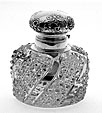ACGA Code of Ethics

Comments on Codes of Ethics
Codes of Ethics are codes for honest and ethical people. Others will disregard them or use them only when it is to their advantage to do so.
Having a Code of Ethics for the ACGA is appropriate in that it provides guidelines for those who want and need to know, and is beneficial for those who are new to American Brilliant Period Cut Glass and to the ACGA.
The ACGA Code of Ethics provides rules and guidelines for ACGA sponsored events.
It is not for, nor would it be possible, governing or policing auctions such as Woody’s or E-Bay. But it is for the guidance of dealers who are ACGA members who advertise and sell over the Internet.
Definitions
Dealer: Any ACGA Member who actively engages in buying and selling of American Cut Glass as a business venture and holds a sales tax number and/or business registration, if applicable, in the state in which the dealer is based.
Appraiser: Any ACGA Member who actively engages in appraising American Cut Glass professionally and for a fee.
Collector, Non-Dealer: Any ACGA Member who actively collects American Cut Glass, and thus on occasion, has a need to sell or put in auction unwanted or unneeded pieces of the collection. These people are not classified as dealers, since such activity is done on rare occasions.
Guidelines for Dealers
-
The dealer, who displays the ACGA decal, must be a member of the ACGA, must procure the decal from the Executive Secretary of the ACGA, and must be knowledgeable in the business as determined by the Ethics Committee.
-
The dealer must be willing to guarantee all sales and refund any purchase, should this merchandise be found to be other than represented. A return policy, if any, must be stated.
-
Price for merchandise for sale must be clearly printed in dollars and cents.
-
A full description of the purchased merchandise must be written clearly on the sales receipt. This receipt must also carry the dealer's name, address, telephone number, and e-mail address, if appropriate.
Guidelines for Appraisers
-
An appraiser must have broad working knowledge of cut glass, including glass manufactured in both America and foreign countries.
-
The appraiser must be able to identify metals, blanks, motifs, and finishes of the glass to be appraised
-
The appraiser must have reliable sources of information to verify the descriptions provided in the appraisal. Sources might include manufacturers' catalogues or copies of them, books or portions thereof devoted to American Brilliant Period cut glass, persons having a reputation for their knowledge of American Brilliant Period cut glass, juried museum exhibits and collections, research reports in refereed or professional journals, and other sources of such quality.
-
The appraiser should be an active member of a national or international society of appraisers that has a Code of Ethics and Professional Conduct. If the appraiser is not a member of the above, the appraiser must provide the person requesting the appraisal a fee schedule prior to making the appraisal. Once approved, the final appraisal must include a complete listing with description and value of the items appraised. A cover letter with appraiser's name, address, telephone number, e-mail address, and date must accompany the appraisal stating no personal interest in the items being appraised.
Guidelines for Collectors
-
Ask all questions and receive acceptable answers prior to completion of the sale.
-
Ask for and receive a Certificate of Authenticity and a sales receipt with full description of the item purchased, the dealers name, address, telephone number, and e-mail address.
-
Do not remove tags or labels until you are positive you are keeping the item. If an item is to be returned by mail, wrap the item properly to prevent damage in shipment and insure for the purchase price. Communicate with the seller prior to return. Enclose a statement declaring the reason for return. 4. Adhere to the dealer's return policy.
Guidelines for Internet Commerce
-
ACGA members selling glass on the Internet should identify themselves as members of the American Cut Glass Association. They should include the words, "We subscribe to the ACGA Code of Ethics."
-
Members who conduct business on auctions, either buying or selling, should be aware that the ACGA has no rules regarding those who participate in this activity, and that it is just good common sense for the buyer to beware.
-
ACGA members who deal with other ACGA members over the Internet auctions are encouraged to abide by the ACGA Code of Ethics.
Revisions to the Code of Ethics
This Code of Ethics may be revised by authorized action of the ACGA Board of Directors.





